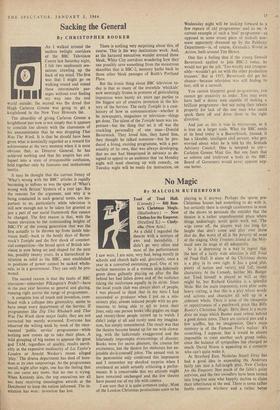Sacking the General
By CHRISTOPHER BOOKER As I walked around the endless twilight corridors
of the BBC Television Centre last Saturday night, I felt two unpleasant sen- sations crawling up the back of my mind. The first was that I might go on walking round and round these interminable pas- sages without ever finding
my way into the real world outside; the second was the dread that Hugh Carleton Greene was going to get a knighthood in the New Year Honours list.
The absurdity of giving Carleton Greene a knighthood just now is not simply that it appears
to coincide too closely with the clumsiness of his announcement that he was dropping That Was The Week. It is that he should have been given what is nominally regarded as a reward for achievement at the very moment when it is most obvious that, as Director General, he has achieved nothing and that his empire has col- lapsed into a state of irresponsible confusion, held together only by licensees and institutional inertia.
It may be thought that the current frenzy of 'What's wrong with the BBC' articles is rapidly becoming as tedious as was the spate of 'What's wrong with Britain' hysteria of a year ago. But the reasons for the argument, and why it is being conducted in such general terms, are im- portant to us, particularly while television is still new enough not to be taken for granted as just a part of our social framework that cannot be changed. The first reason is that, with the recent elevation to the commanding heights of BBC-TV of the young generation that was the first actually to be thrown up from inside tele- vision itself—back in the heady days of Bayer- stock's Tonight and the first shock of commer- cial competition—the broad spirit of British tele- vision is now being set and shaped for the next ten, possibly twenty years. In a hierarchical in- stitution as solid as the BBC, men established in positions of power cannot be sacked whole- sale, as in a government. They can only be pro- moted.
The second reason is that the faults of BBC television—remember Pilkington's PrideT—have in the past year become so general and glaring, running right across the range of programmes.
A complete loss of touch and invention, com- bined with a collapse into gimmickry, seems to have swept every department of the Service. If programmes like Dig This Rhubarb and That Was The Week show major faults, they are not corrected but merely worsened. Everyone has observed the wilting week by week of the once- vaunted 'public service' programmes—while nothing new comes up to take their place. A wild grouping of big names to appease the great god TAM, regardless of quality, results inevit- ably in the expensive mediocrity of Liz Taylor's London or Arnold Wesker's recent alleged 'play.' The drama department has died of bore- dom at its own outpourings. As the programmes unroll, night after night, one has the feeling that no one cares any more, that no one is trying. When Kennedy dies, the top executives are all too busy receiving meaningless awards at the Dorchester to keep the nation informed. The in- stitution has won : invention has lost. There is nothing very surprising about this, of course. This is the way institutions work. And, as the harassed executives wander around those bleak, White City corridors wondering how they' can possibly save something from the monstrous shambles that is BBC-2, memory harks back to those other bleak passages of Reith's Portland Place.
But the ironic thing about BBC television to- day is that so many of the erstwhile 'whizkids' now seemingly frozen in postures of gesticulating impotence were barely six years ago parties to the biggest act of creative invention in the his- tory of the Service. The early Tonight is a case- history of how in communication—whether it be newspapers, magazines or television—things get done. The talent of the Tonight team was im- portant—but the thing that set it off was the crackling personality of one man—Donald Baverstock. They loved him, they hated him, they thought he talked nonsense—but he pro- duced a living, exciting programme, with a per- sonality of its own, that was always developing, that no one had blueprinted in advance as de- signed to appeal to an audience that 'on Monday night will need cheering up with comedy, on Tuesday night will be ready for instruction, on
Wednesday night will be looking forward to a few repeats of old programmes' and so on. A current example of such a 'real' programme—as opposed to some ersatz piece of midcult non- sense apparently dreamed up by the Publicity Department—is, of course, Granada's World in Action, built around Tim Hewat.
One has a feeling that if the young Donald Baverstock applied to join BBC-2 today, he would not get the job. 'Too woolly and irrespon- sible—wouldn't get on with the other production trainees.' But in 1957, Baverstock did get his chance—because television was still finding its feet, still in a turmoil.
You cannot blueprint good programmes, you cannot get creativity to order. You may even have half a dozen men capable of making a brilliant programme—but not using their talents properly for lack of the one man who could spark them off and drive them in the right direction.
And just as this is true in microcosm, so it is true on a larger scale. What the BBC needs at its head today is a Beaverbrook. Instead, it has a likeable, intelligent civil servant, who gets worried about what he is told by •the Scottish Advisory Council. One is tempted to cry— Carleton Greene Must Go. But one fears that so solemn and irrelevant a body as the BBC Board of Governors would never appoint any- one better.






























 Previous page
Previous page